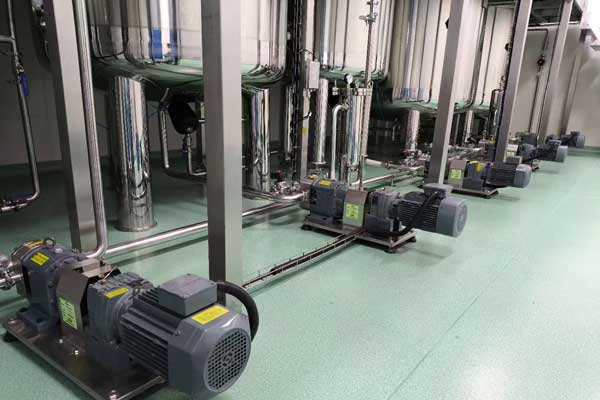Choosing the right pump for an industrial application isn’t just about picking the most powerful option—you need to consider how the pump will interact with the fluid, the operating environment, and the specific demands of your project. Whether you’re working with centrifugal pumps, screw pumps, diaphragm pumps, or lobe pumps, the selection process can get complex. But don’t worry! Let’s walk through the key considerations to help you make the best choice, with a special focus on how lobe pumps might just be the solution you didn’t know you needed.
Understanding Different Pump Types for Industrial Applications
First off, not all pumps are created equal. Each pump type has its own strengths and limitations, and your decision should depend on what kind of fluid you’re handling and what your system requires. Let’s break down a few common pump types and where they excel:
Centrifugal Pumps
Think of centrifugal pumps like the workhorses of the industry. They use a spinning impeller to push fluids outward and are great for jobs that need a steady, high flow of low-viscosity liquids.
- Where You’ll See Them: Water treatment, HVAC systems, irrigation—basically anywhere you need to move a lot of water at lower pressures.
- The Catch: If you’re dealing with thicker fluids or solids, centrifugal pumps can struggle. They’re best for cleaner, lighter fluids.
Screw Pumps
Screw pumps are like the smooth operators in the pump world. They use a screw mechanism to move thick, viscous fluids easily and offer a consistent flow even under high pressure.
- Where You’ll See Them: Oil and gas industries, chemical processing, and any application that involves sticky, slow-moving fluids.
- The Catch: They’re not the best for handling abrasive materials since that can wear down the screws over time.
Diaphragm Pumps
These pumps use a flexible membrane to move fluids, creating a perfect seal between the liquid and the pump. If you’re working with corrosive, abrasive, or hazardous materials, diaphragm pumps are your best bet.
- Where You’ll See Them: Chemical processing, wastewater treatment, and any industry where fluid safety is critical.
- The Catch: They tend to have lower flow rates compared to centrifugal or screw pumps, so they might not be ideal if you need to move large volumes quickly.
Lobe Pumps
Lobe pumps are the gentle giants of the pump world. They use rotating lobes to move fluid without the lobes ever touching, which means they’re perfect for delicate, viscous, or solid-containing fluids.
- Where You’ll See Them: Food and beverage industries, pharmaceuticals, and any application where you need to handle products gently and avoid damage.
- Why They Shine: Lobe pumps are versatile, easy to clean, and can even handle solids without damaging the pump—perfect for products like jams, creams, or slurries.
Key Factors to Consider When Choosing a Pump
Now that you’ve got a feel for the different types of pumps, how do you decide which one fits your specific needs? Let’s look at a few key parameters that can help guide your decision:
Viscosity
- For Thick, Sticky Fluids: If you’re dealing with high-viscosity fluids like oils, syrups, or slurries, positive displacement pumps like lobe or screw pumps are your go-to. These pumps handle thicker fluids without a hitch, delivering a steady flow no matter how resistant the fluid might be.
- For Thin Fluids: Centrifugal pumps are perfect for low-viscosity fluids such as water or chemicals. They offer high flow rates with minimal energy use—ideal for large-scale water systems or chemical processes.
Flow Rate
- Need a High Flow Rate?: If your job requires moving a lot of fluid fast—like cooling systems or large-scale water treatment—centrifugal pumps excel at delivering high flow rates efficiently.
- More Controlled Flow?: Diaphragm and lobe pumps are better suited for applications that require more precise flow control, such as chemical dosing or food processing, where you can’t afford to waste product or compromise quality.
Pressure Requirements
- High Pressure Demands: Applications that call for high pressure, like oil transfer or chemical processing, often need screw or diaphragm pumps to handle the job without breaking a sweat. Lobe pumps can also manage moderate pressure well.
- Low Pressure Situations: If low-pressure operation fits the bill, centrifugal pumps are your best bet. But they can struggle to maintain flow at higher pressures, so they’re better for more straightforward applications.
Temperature
- Handling Heat: Stainless steel lobe pumps are a top choice when you’re working with high-temperature fluids, especially in industries like food processing where sterilization is key. Diaphragm pumps, on the other hand, can handle extreme heat with materials like PTFE.
- Cold Environments: If fluids get thicker at lower temperatures, screw and lobe pumps are ideal for maintaining steady performance despite the chill.
Fluid Composition
- Corrosive or Abrasive Fluids: Diaphragm pumps made with corrosion-resistant materials like PTFE are perfect for handling aggressive chemicals or slurries.
- Delicate Products: If you’re working with sensitive fluids—like creams, gels, or food products that can’t be sheared or damaged—lobe pumps are the ideal solution. Their gentle handling ensures the product stays intact.
Real-World Applications of Lobe Pumps
Lobe pumps aren’t just versatile—they’re game-changers in industries where product integrity is crucial. Let’s explore how they’re used in real-world settings:
Food and Beverage Industry
- Application: Think of transferring thick products like jams, sauces, or even yogurt. Lobe pumps do this without crushing or damaging the product.
- Why They’re Ideal: Their non-contacting lobes mean minimal wear and tear on the pump and the product. Plus, they’re easy to clean, which is crucial for maintaining hygiene in food production.
Pharmaceutical and Cosmetic Industry
- Application: Whether it’s creams, ointments, or gels, lobe pumps are perfect for handling sensitive, high-viscosity materials.
- Why They’re Ideal: Lobe pumps maintain the integrity of active ingredients and delicate textures, which is a must in pharmaceuticals and cosmetics where product quality can’t be compromised.
Wastewater Treatment
- Application: Lobe pumps are widely used for handling sludge and slurry in wastewater systems.
- Why They’re Ideal: Their robust design allows them to manage abrasive particles without clogging or breaking down, making them highly reliable for tough jobs in treatment plants.
Conclusion: Finding the Right Pump for Your Needs
Selecting the right industrial pump isn’t a one-size-fits-all situation. It’s all about understanding the specific demands of your application—whether it’s the viscosity of the fluid, the pressure requirements, or how delicate the product is. Lobe pumps, with their gentle handling and versatility, are often the perfect fit for industries like food processing, pharmaceuticals, and wastewater treatment. But no matter what your needs, carefully weighing these factors will ensure you choose the best pump, improving efficiency and reducing downtime in the long run.


